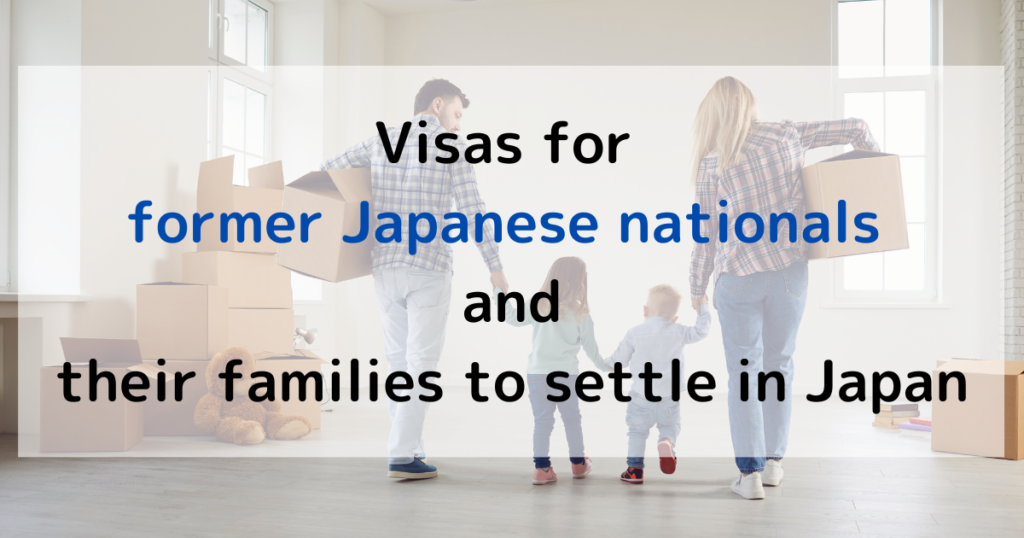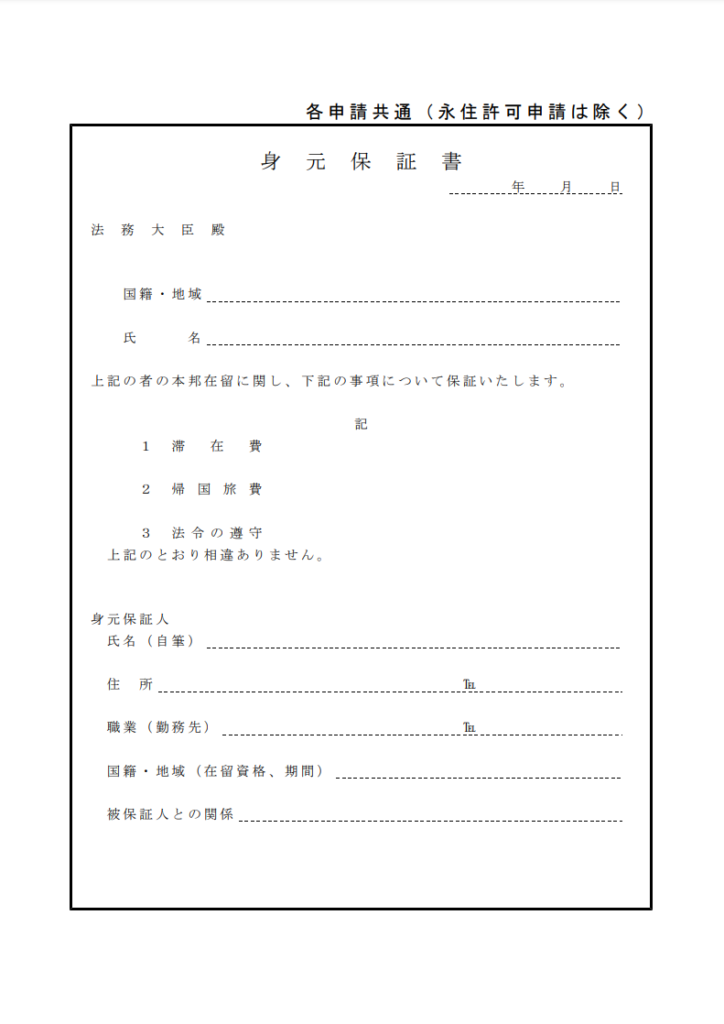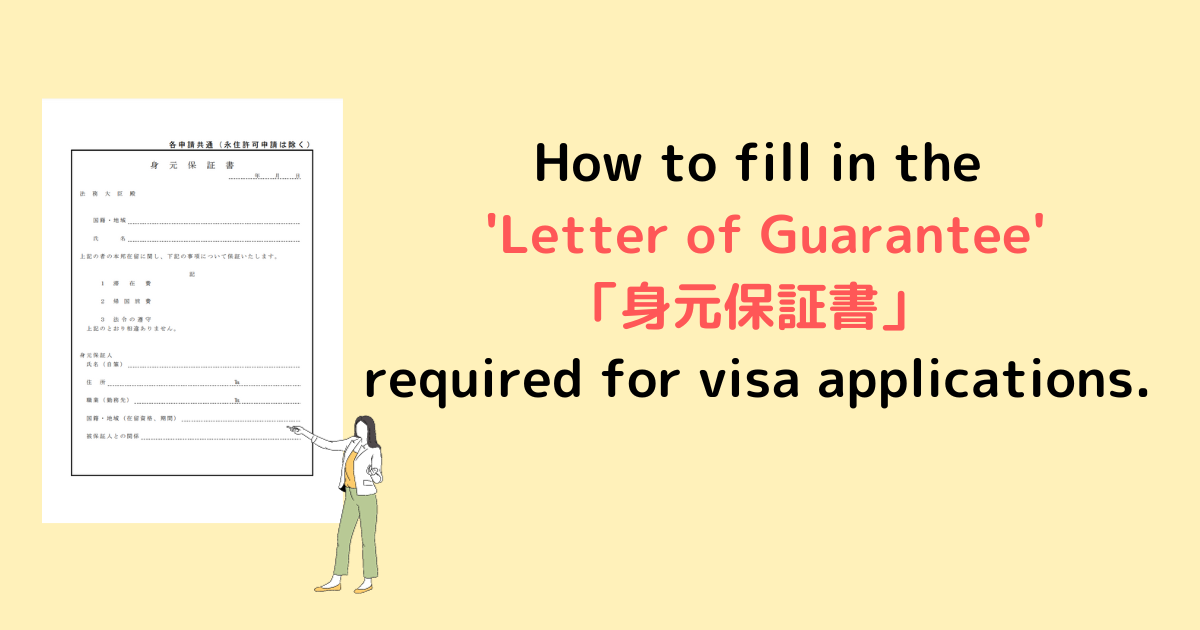
For example, many Japanese nationals who have emigrated abroad lose their Japanese nationality when they acquire the nationality of that country or foreign country and become former Japanese nationals, but many want to move back to Japan to coincide with a turning point in their lives. If you are a former Japanese national but a foreign national, you will need a status of residence (visa) in order to live in Japan. This part explains the ‘Spouse or Child of Japanese National(日本人の配偶者等)’ status applied for by former Japanese nationals in such cases, and the ‘Long Term Resident(定住者)’ status applied for by family members (wife, husband and children) of former Japanese nationals.
Even former Japanese nationals need a status of residence to live in Japan.

For example, even in the case of a person who was Japanese born in Japan but has now emigrated abroad and acquired foreign citizenship, their status in Japan will be ‘foreign national’ when they move to Japan, so a residence permit is required.
Consider residency status for living in Japan
In order to live in Japan, it is necessary to select and obtain an appropriate status of residence according to the purpose of the activity and status. In this case, many people enter Japan with the status of ‘Spouse or Child of a Japanese National’.
If you acquire foreign citizenship, you lose your Japanese citizenship.
In the first place, Japan basically does not recognise dual nationality, so if you acquire a foreign nationality, you lose your Japanese nationality. For this reason, even former Japanese nationals cannot live in Japan without a visa as long as they have a foreign nationality, even if they still have a Japanese passport.
Consider which status of residence to enter the country.
A status of residence (visa) can be obtained if you meet the requirements for your purpose of entry.
For example, if you are a university graduate (regardless of the country from which you graduated) and you want to work for a Japanese company, you should consider the status of residence “Engineer/Specialist in Humanities/International Services(技術・人文知識・国際業務)” if you mainly work in what is known as a white-collar job. If you want to start your own business in Japan, the “Business Manager(経営・管理)” visa status will apply. These work visas focus on the content of the activity, and can be selected even by former Japanese nationals if the requirements are met.
Many former Japanese nationals who consider moving to Japan may be ‘children’ of Japanese nationals. If so, they can choose the status of residence (visa) of ‘spouse or child of Japanese national’. This status of residence (visa) differs from the one focusing on the content of the activity described earlier, as it is a visa focusing on status, so there are no restrictions on activity or work. In other words, you can become a salaried worker, start your own business or be unemployed.
For this reason, many former Japanese nationals who are children of Japanese nationals choose “Spouse or Child of Japanese National” to enter Japan. On the other hand, if the “former Japanese national” is not a “child of a Japanese national”, other statuses of residence should be considered.
Requirements for “Spouse or Child of a Japanese National” status of residence
・biological childen
・Adopted children with a special adoption
The requirements for a ‘child’ of a Japanese are that the child must be a biological child born to a Japanese national or a specially adopted child of a Japanese national (ordinary adopted children are not eligible). Note that the nationality of the parents need only have been Japanese at the time of birth, so Japanese nationality at the date of application is not required. Even if the parent is deceased on the date of application, the application can still be made if the other requirements are met.
Residence status of family members of former Japanese
Similarly, family members of former Japanese nationals are required to obtain the status of residence that meets their respective requirements and live in Japan. The status of residence that can be chosen depends on the spouse (wife/husband) and children.
Spouse’s (wife/husband’s) status of residence
The basic idea is the same as for former Japanese nationals. It is possible to choose a status of residence (visa) related to an activity such as a work visa that suits the purpose and meets the requirements, but there is a status of residence that the spouse (wife or husband) of a ‘former Japanese national’ can choose. If the former Japanese national is residing in Japan under the status of ‘Spouse or Child of Japanese National’, the status of residence ‘Long Term Resident’ (Notification No. 5 (a), Spouse or Child of Second-Generation Japanese-American(告示5号イ・日系2世の配偶者)) is applicable. This ‘Long Term Resident’ status has no restrictions on activities or employment.
A former Japanese national’s application for ‘Spouse or Child of Japanese National’ and his/her spouse’s application for ‘Long Term Resident’ (Notification No. 5, spouse of a second-generation Japanese American) can be made at the same time, and if both of you are granted permission, you can enter Japan together.
Status of residence of the child
The concept is the same for children: it is possible to choose a status of residence (visa) for activities such as a work visa that suits the purpose and meets the requirements, but there is a status of residence that “children of former Japanese nationals” can choose.
First, if a parent had acquired Japanese nationality at the time of the child’s birth, a “spouse or child of Japanese nationality” can be selected. As mentioned above, the requirement is fulfilled if one of the parents is a Japanese national at the ‘time of the child’s birth’. Depending on the circumstances, if you were born in Japan, you yourself may have been a Japanese citizen (and your child is a former Japanese citizen).
Next, if the parents were not Japanese at the time of birth, the status of residence “Long Term Resident” (Notification No. 3, third-generation Japanese America(n告示3号・日系3世)) applies. This Long Term Resident status also has no restrictions on activities or employment.
The following cases are applicable.
・Biological children of former Japanese nationals (only those born as children of Japanese nationals) after renunciation of Japanese nationality.
・grandchildren who are biological children of biological children of former Japanese nationals before they renounced their Japanese citizenship.
How can I re-acquire Japanese citizenship or apply for permanent residence in the future?

Former Japanese nationals who wish to naturalise or take up permanent residence must meet the respective requirements.
If you want to acquire Japanese citizenship (apply for naturalisation)
In addition to (so-called) ‘ordinary naturalisation(普通帰化)’ as defined in Article 5 of the Nationality Act, some applications for naturalisation may also fall under the category of ‘simplified naturalisation(簡易帰化)’, where the applicant has a Japanese family member or special geographical ties to Japan, and some of the requirements may be relaxed.
Former Japanese nationals may also fall under the category of “simplified naturalisation”.
Application for naturalisation of “former Japanese nationals”, Article 8 of the Nationality Act(国籍法).
Naturalisation of “former Japanese nationals” is provided for in Article 8 of the Nationality Act.
Article 8The Minister of Justice may permit naturalization of a foreign national who falls under one of the following items even if that person has not met the conditions listed in Article 5, paragraph (1), item (i), item (ii), and item (iv):
Nationality Act Article 8
(i) a person who is a child (excluding an adopted child) of a Japanese citizen and has a domicile in Japan;
(ii)a person who is an adopted child of a Japanese citizen, continuously has had a domicile in Japan for one year or more, and was a minor according to the person’s national law at the time of adoption;
(iii) a person who has lost their Japanese citizenship (excluding a person who has lost their Japanese citizenship after naturalization to Japanese citizenship) and has a domicile in Japan; or
(iv)a person who was born in Japan without any nationality and has continuously domiciled in Japan for three years or more since that time.
As mentioned above, some of the requirements may be relaxed compared to ordinary naturalisation if the person is the natural or adopted child of a Japanese national or was previously a Japanese national and lives in Japan. The cause of loss of nationality is not required. It is also fine if you acquired foreign nationality at your own volition or lost it due to nonreservation of Japanese nationality.
Requirements for naturalisation of former Japanese nationals
For “former Japanese nationals”, some of the requirements for “ordinary naturalisation” are relaxed on the grounds that they have “close blood or geographical ties with Japan”.
Relaxed requirements do not mean that the screening process is less rigorous or that some of the documents required are fewer. For people with close blood or geographical ties, four points are checked.
- Be of good conduct
- The ability to renounce the nationality of the home country by acquiring Japanese citizenship.
- Not be a terrorist or anti-social force.
- Have no problems with Japanese language skills
In other words, if a former Japanese national “has an address in Japan” and satisfies the above four points, there is a possibility that his or her application for naturalisation will be approved.
※However, as stated in the law, those who lost their Japanese nationality after naturalisation are excluded.
If you want to apply for permanent residence permit
When applying for permanent residence permit, the minimum requirement is one year of residence. However, the period of stay at that point must be “three years” or “five years”, which is not always easy to obtain, even for former Japanese nationals, so it may not be possible to apply immediately.On the other hand, in recent years, the criteria within the Legal Affairs Bureau(法務局) have become stricter in the application for naturalisation, so it is difficult to be granted unless you have a period of stay of ‘three years’ or ‘five years’.
Permanent residence is granted if the applicant has been in the country for at least three years and meets the national interest compatibility requirements, which are that the applicant has not committed any crimes, has properly fulfilled his or her official obligations (especially tax payments) and is not potentially harmful from a public health perspective.
▶Immigration Service Agency:Guidelines for Permanent Residence Permit
The process of applying for status of residence and entering Japan – in the case of a ‘spouse or child of Japanese national’.

This section explains the process, assuming that a former Japanese national who is the biological child of a Japanese national applies for the status of “Spouse or Child of Japanese National”.
Procedures for entering Japan
The procedure for inviting a family member (wife, husband or child) abroad to Japan is called ‘application for a certificate of eligibility(在留資格認定証明書交付申請)’. This procedure is carried out at the Immigration Service Agency by the person calling them (Japanese national) as their representative. If both husband and wife are abroad, a Japanese relative can act as their representative for the procedure.

Cooperation of relatives in Japan is required for the application.
The ‘Application for Certificate of Eligibility’ is a procedure carried out at the Immigration Service Agency, but there are certain rules regarding the application procedure (e.g. who can apply, where to apply, required documents, etc.).
Who can apply at the Immigration Service Agency.
When inviting a foreigner from abroad, the application can basically be made by a Japanese national residing in Japan who is inviting the applicant (foreigner) or a relative of the Japanese national as a representative. The application is submitted to the Immigration Service Agency with jurisdiction over the applicant’s intended place of residence or the place of residence of the applicant’s relative or other representative. If the applicant is a child under 16 years of age, a legal representative (e.g. parents) can apply on their behalf.
In both cases, simultaneous entry to Japan for both spouses is possible if the conditions are met.
On the other hand, a notified ‘Agent(取次者)’ can make the application on behalf of the applicant. Examples of ‘agents’ are administrative scrivener(行政書士) and lawyers.
*A request can also be made to an administrative scrivener.
Basically, the application is filed at the Immigration Service Agency with jurisdiction over the applicant’s place of residence, or the place of residence of the foreigner or the applicant’s representative.
About guarantors
Former Japanese nationals and their spouses also need a guarantor when applying. In the case of Japanese or foreign nationals, permanent residents or special permanent residents can become guarantors, while in the case of ‘Spouse or Child of Japanese National’ or ‘Long Term Resident’, the spouse (wife/husband) or dependent (e.g. parent) must be a guarantor.
The guarantees are “1. Living expenses while in Japan”, “2. Transportation fee for repatriation” and “3. To abide by the Japanese law”, which are not legally enforceable, but do entail certain responsibilities.
This can be a hurdle for those who have been away from Japan for a long time and are emigrating. The following article provides a detailed explanation of the ‘Letter of Guarantee(身元保証書)’.

Documents required
| In the case of children |
|---|
| ・Application form for issuance of certificate of eligibiity(在留資格認定証明書交付申請書)/Application for permission to change status of residence(在留資格変更許可申請書) ・Photo ・1 copy of applicant’s parent’s family register or removal from register (certificate of all matters)(戸籍謄本又は除籍謄本(全部事項証明書)) ・(If you were born in Japan)Birth registration acceptance certificate(出生届受理証明書)/Certificate of recognition notification acceptance(認知届受理証明書) ・(If you were born overseas) Birth certificate issued by an institution in the country of birth(出生証明書)/Certificate of recognition of the applicant issued by an institution in the country of birth(認知に係る証明書) ・(In the case of special adoption) Special adoption notification acceptance certificate(特別養子縁組届出受理証明書) etc ・Documents proving the cost of staying in Japan ・Letter of guarantee(身元保証書) of the parents(Japanese) |
*In addition to the above, documents may also be submitted to provide supplementary information about your life and past residence status. The above is the minimum required documentation.
Conclusion

The above explains the status of residence that former Japanese nationals and their family members often apply for when moving to Japan. In most cases, former Japanese nationals apply for ‘Spouse or Child of Japanese National’ and their family members apply for ‘Long Term Resident’ status. If you wish to become a Japanese citizen again or receive a permanent residence permit in the future, you will often not meet the requirements immediately, and you will have to continue with appropriate residency and wait for the day when those conditions are met.



